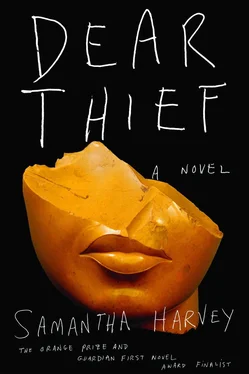You will know the escritoire I sit at to write this — the one that used to be in the hallway in my parents’ house, with its tambour top that no longer rolls smoothly, and the six miniature drawers full of pointless things my father found and could never bear to part with. I inherited the desk from him, and I have not got rid of those things. I am sorry to tell you that my parents both died by the mid-nineties, my father first, then my mother three years later. Really, they were better than me in so many ways — richer, happier, more travelled, more generous and loving, more panoramic of mind. Since being in my hands the escritoire is a mess. Of course, it was never a mess in their hands, except inside the drawers where it couldn’t offend the eye. So I have invented a foolish little measure for keeping some order, to do right by my father all these years beyond the grave (in the way we do keep trying, all our lives, to do right by our parents, whether we know it or not): there is a piece of Roman jet, a conch and the oval of amber you gave me that sits on the beech like a spoonful of honey; these three are always on the desk somewhere, gauging the mess as groynes gauge the height of the tide, and if I can see them I know — with a sense of daughterly relief — that the mess is not winning.
I’ve lived in this flat for two years, which is not long in terms of belonging to a place but long enough to be exempt from the charge of passing through. This might account for the look that I know is often on my face, that I catch sometimes in the mirror, a look of wary attachment, suspicious belonging. But then maybe the look is not that at all but just the general cross-purpose muddle of the ageing face in which all kinds of incompatible things have collided. Surprise, torment, pleasure, peace, disillusionment. All of these separately and at once. And on the subject of surprises — and I would like you to contain your mirth and judgement if you can — I have taken full-time work in a care home; maybe this explains the wary look, suspicious of death perhaps, or what awful ambush waits for our bodies around the corner.
You are opening your mouth to object about this care-home job (like some born-again Christian foisting your light upon the world, you will say), but what of it, my friend? For once you have no right or means to reply, and so I continue. Until I moved here I was living in my parents’ old house, which I inherited from them with the escritoire and everything else. So large and alive with their successes and love — but you know the house was too big for one person, too big for two people even, and when Teddy and I were there we thought we could hear it expanding around us. When Teddy left home for university four years ago I stayed on for a couple of years until it became unbearable; then I sold it and came to this flat.
Even before Teddy left we had resorted to living mostly in the kitchen. The red room had fallen out of use since a family of starlings got bold and moved into the chimney stack, and in hindsight I think that was the beginning of their dominion. Those rare occasions when we did use the room the starlings’ occupancy meant we couldn’t light the fire, and so the room was for summer days only, doors open wide to the moths, dust, flies, mice and spiders; Teddy set up his tripod and photographed the room’s gradual surrender to nature, a process that completed itself beautifully during the second winter of the starlings’ stay, when the birds came down through the open damper and got into the house. He caught shots of them in flight above the dresser, in front of the television, in front of the mirror above the fireplace, and it was that one, that single fortunate shot of a starling and its reflection in flight in an Art Deco mirror, that got him his place on a photography course at university and prompted me — now that my only child had, as they say, flown the nest and I was alone — to leave the village.
I bought this place without looking any further: not so far from Russell Square, much beyond what I could afford, but I had looked on the outskirts and it seemed to me that it wouldn’t do; so I had to use some of the nest egg I’d set aside for Teddy from the sale of my parents’ house in Morda, and even then I couldn’t say that what I bought is anything more than basic. It is one of those many London Regency buildings that lost its decency a good hundred and fifty years ago and was carved into flats, mine having two small bedrooms, a windowless kitchen, a big, light living room, but then this, this magnificent thing — a stained-glass window at the back, in the bathroom, with the image of a hummingbird braking hard at a fuchsia, all electric blues, greens and reds, an uplifting sight when the evening sun comes through and one that makes me think always of Teddy’s photograph.
Playing cards, hand after hand. Bending willow, shaking boughs for apples, reading erotic scenes from our parents’ novels. Drawing one another’s faces. Drawing on one another’s backs. Knees up in winter by the fire, looking at your father’s sketches of plants and your mother’s photographs of you as a baby clenching your fists. Bolting down the lanes at Morda, hollering, Come on then! It was all about your need to throw yourself at every corner in defiance of what was around it, and so we bolted and ran, and even when we walked it was fast, and even when we sat slouched over a task you were leaning into it, showing your back to whatever doubt said that you were not capable.
You were going to walk east to west across America, from Rhode Island to a place called Eureka in a straight line. One day you would lay out a map of North America and say, Done that. I would crop my hair like a field of winter wheat, and you were going to rewrite the Talmud in rhyming couplets or otherwise in limericks and publish it as a new religion. We would pave one of Morda’s fields with slabs of granite inscribed over and over with our names. I was going to marry below me and live on love. You would not shave, or wear dresses. You were going to accept death long before you died. I was going to sing: Mozart, Handel, Fauré, Joan Baez, Edith Piaf. I was going to sing and sing, and you were going to compose your new religion and not brush your hair or be precious about your body, which was given you as a strange gift that had come without a label and for whom you had nobody to thank.
Bolting down the lanes late for school, bolting down those same lanes year upon year late or drunk on your parents’ firewater, which we stole and replaced with lightly brewed tea, knowing it might be years before they noticed. Breaking out like horses and shouting Starka! after the name on the bottle because we liked the way it sundered the Shropshire calm. You brushed off male interest whenever it came, scarce though young men were in our village of farmers and ex-miners. You looked at men sidelong and would respond to their interest by saying placidly, ‘Thank you, no’ and lighting a cigarette.
Your brother would hand over 50mg of phenylpropanolamine, or 40mg of amphetamine, and he would tell us with a liquid tongue that your father’s assiduous cataloguing of English flora was a final treachery. He had stolen — confiscated — your father’s handmade collections. I remember him (the dull clang as he sat on the piano keyboard, and the back of his shorn head in the mirror behind him, which didn’t seem to belong to the same person as the face, which was wide and kind and always appeared to know something we didn’t — this is how I always think of him, in two mismatched halves) — I remember him leafing through the pad of faint sketches of dandelions, campion, honeysuckle, aquilegia, love-in-a-mist, flicking the pages with the back of his hand as he talked about his friends in Lithuania who were staying to fight for the cause. Because it was one thing to escape communism as your parents had done, but another to deny where you had come from, to start drawing dandelions neatly labelled in the bottom left Taraxacum officinale . It was true, I suppose, that when he showed us the botanical catalogues your father had made of Lithuania’s native hepatica, meadow rue, yarrow, gladioli, the drawings were more eager, the ink more mutinously pressed into the page; because they were not limp inventories like the English catalogues, but urgently amassed proof of what the Soviets were about to wipe out. To which you, who had left Lithuania as a baby and had never known the place, said uncertainly, ‘And yet, who cares?’
Читать дальше












